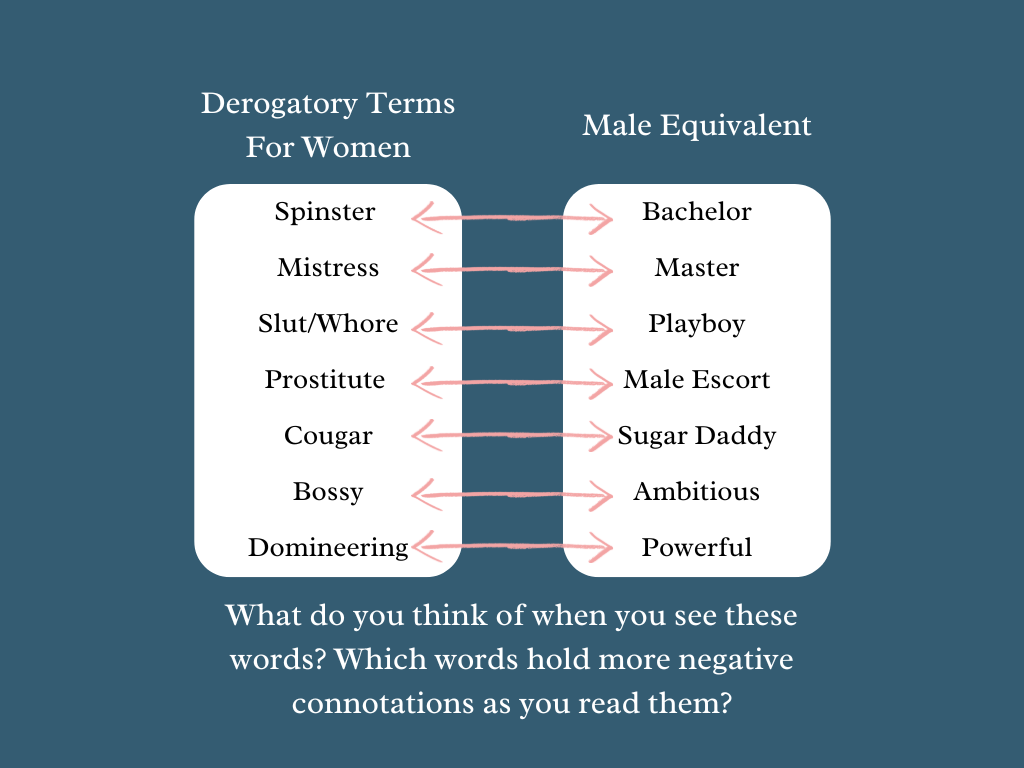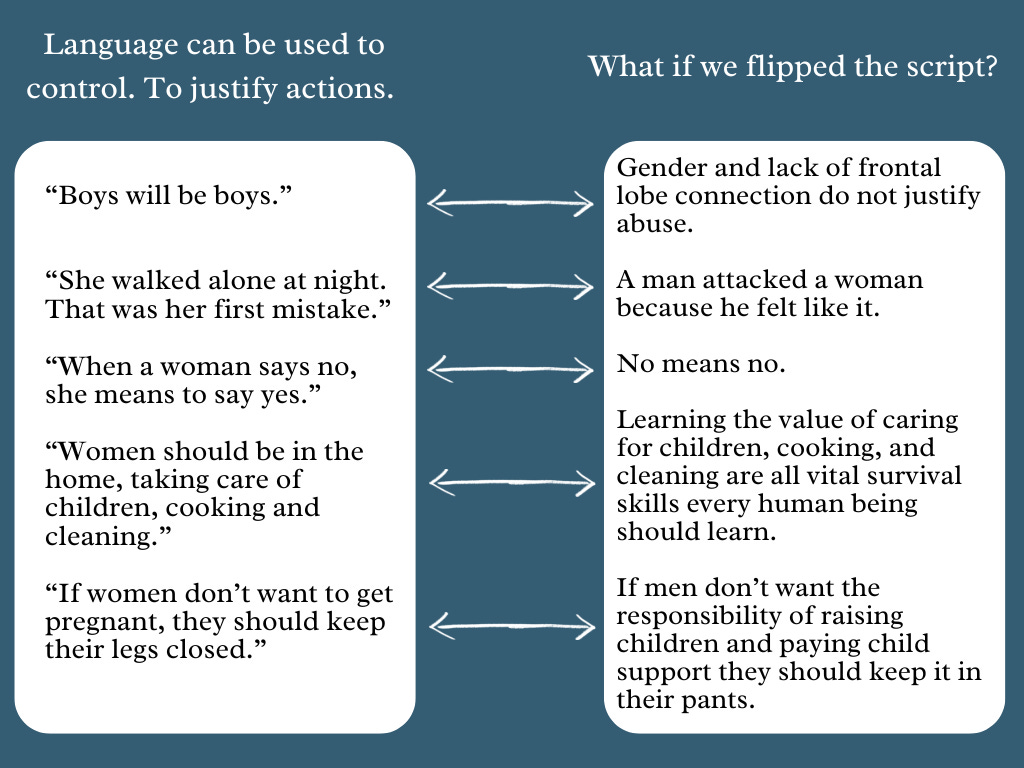The Power Of Language
The meaning we assign to the words spoken from our mouths has a profound impact on how we view ourselves, and those who are different from us.
I recently read a book titled Cherokee Women In Charge. I stumbled across a passage I found particularly interesting. The original Cherokee language did not have any insults for women. In fact, if you wanted to insult anyone, an individual would have to use terms specific to that person. Which meant there was no collateral damage to anyone else, unlike the word bastard.
Conversely, did you know, the English language has 56 pejorative terms for women and 27 for men?
I think we can all agree, this list isn’t comprehensive either.
It made me realize how powerful language is.
We use language to communicate our thoughts and feelings to the world and the people around us. The meaning we assign to the words spoken from our mouths has a profound impact on how we view ourselves, and those who are different from us. Whether that is race, dialect differences, or simply gender, each word we use to describe human beings, or how we communicate with others has been carefully crafted through centuries of language creation. It is shaped by the beliefs and values we hold internally, and by a variety of factors including family, friends, culture, education, and life experiences to name a few.
Our language indeed evolves with society in addition to our changing cultural values.
Let’s take spinster for example. This is a Middle English word that first appeared around the mid-1300s. It was used to describe a woman who spun wool. By the 17th century, it was used in legal documents to describe an unmarried woman, typically older than the age desirable for marriage. It thus became a derogatory term, meant to insult women who had not secured a husband and never would at their age. On the flip side, a man who was older and passed the desirable age for marriage was called a bachelor, a term still used today and one that does not have any negative connotation attached to it.
Similarly, mistress was a respectable title and was equal to the title of master used for men. Eventually, it evolved to describe a woman who had an extramarital affair with a man on the side. It is not commonly used today, however, it is still a term used to describe these types of affairs, even in a joking manner.
Bastard was a term used to describe an illegitimate child who was born from sexual intercourse between two individuals who were not married. Not only did this insult children, both male and female, for their illicit entrance into the world (which was not at all their fault) but it attacked the perceived misgivings of their parents, in particular their mother.
Additionally, this is a term that developed because of cultural values and beliefs regarding marriage and how individuals should live within society. This type of term would never exist in a society where these cultural values don’t exist.
The terms I listed above may not have as much power today as they once did, but they are prime examples of how language is used to insult and punish women for who they are. And it is no different today.
Our internal beliefs and ideals are reflected in our language.
Often, it's not necessarily one word, but multiple. Sentences can be just as powerful at degrading and dehumanizing women, that we don’t even notice it. They become ideas and morph into morals that dictate how humans should live, and perhaps more importantly, the way society views and values women.

In case anyone forgot what the definition of a war is;
A state of usually open and declared armed hostile conflict between states or nations
A period of such armed conflict
Soon, these words become so commonplace in our society that we don’t even recognize how they shape our cultural views of women. We become numb to their power, not realizing the incredible effect they have on our perceptions of who we are. They creep into the crevices of our societal values so that we don’t end up holding men accountable for their actions.
If you listen closely enough, you can identify exactly what someone thinks as they stare at you from across the table, or from what they say in a video.
Even if negative views are denied when asked, these beliefs become internalized. It is not uncommon for individuals to express their opposition to such speech openly. But if they openly defend voting for someone who uses abusive speech towards women, or even adamantly support someone who has abused women, they might not even realize how these internalized beliefs affect their views.
The fact that men can go on television and talk about abusing women, and yet be elected to our highest form of government, or make thousands on YouTube and TikTok selling an ideology that glorifies the abuse of women, shows that women are not treated equally in our society.
This is a reflection of our society.
But we can change it. We can decide to use new language and shape our views into new ways of thinking. We can actively challenge and reject harmful rhetoric, and hold people accountable for their language and their actions. Only then can we foster a culture of respect and equality, one that truly values and upholds the dignity of all individuals and is reflected in our language and more importantly, in our society.
Imagine the power of language used to describe the world around us.
Are we surrounded with words that uplift, love, and advocate?
Or is the language used to justify the abuse of women and control them?
The English language can be beautiful. It has been estimated that there are roughly 1 million words in English.
Our only limitations to learning new language are those we place on ourselves. It's time for all of us to:
Pick up a dictionary.
Read a book you may have never thought to pick up before.
Experience something new by traveling somewhere you've never been before.
Activate our listening skills, and hear a new perspective without the intent to argue.
It’s never too late to learn some new words and more importantly, explore new ways of thinking.
Before you dismiss this post because it challenges you to think in a way you may have never thought before ask yourself this,
Why are there so many more words in the English language that insult, dehumanize, and degrade women?
How do we feed into this continued sexist and misogynistic language in our own daily lives? What can we do to change it?
Until next time,
Anne’s Musings



Wonderful article Anne! Throughout my career, I have been called many things. I had an older female boss who would caution me about being too aggressive or arrogant. At the same time I had a gay male boss who would tell me to ignore the jealousy and continue to be assertive and confident. I can remember being on a panel at Harvard discussing changing perspectives on special education criteria and intervention. I stated my disagreement with a Ph.D from Texas and he suggested that my “opinion” was perhaps due to my limited experience as I was “just a speech pathologist” and not a special education researcher and he called me “little lady” in his ingratiating fake gentleman drawl. It was another researcher from Vanderbilt who checked this jerk by calling my “opinion” a powerful understanding and synthesis of current research. It was a moment that many women have and will continue to experience. Hopefully we will begin to attend to the power of language more closely. You are my hope for the future.